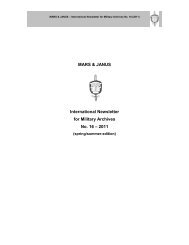National Experiences - British Commission for Military History
National Experiences - British Commission for Military History
National Experiences - British Commission for Military History
You also want an ePaper? Increase the reach of your titles
YUMPU automatically turns print PDFs into web optimized ePapers that Google loves.
118 ai r p o w e r in 20 t H Ce n t u ry do C t r i n e s a n d em p l o y m e n t - nat i o n a l ex p e r i e n C e s<br />
Thanks to the work of Alfred Hurley, biographer of Billy Mitchell, we now know<br />
that when he was in Washington, Guidoni sent an Italian Aviation Journal’s summary<br />
of “The Command of the Air” to Air Service HQ and to “Aviation” magazine. The<br />
editor of the magazine discussed the piece with Mitchell, published an appreciation<br />
of “The Command of the Air” by Guidoni in his magazine (Nov. 1922), and planned<br />
to publish a translation of the entire book. In a letter to Douhet, Guidoni quoted the<br />
editor as saying that Mitchell was much impressed; the editor had also compared<br />
Douhet to Mahan. When he was in London, Guidoni certainly passed over Italian<br />
aviation publications to the Air Ministry. Did he, or any of his predecessors, supply<br />
in<strong>for</strong>mation on Douhet to <strong>British</strong> Aviation journals like “Flight” or “The Aeroplane”,<br />
both of which gave extensive coverage to the aeronautical developments taking place<br />
in Italy from the mid 20s? Incidentally, it is possible that the <strong>British</strong> Air Attaché in<br />
Washington sent a copy of Guidoni’s article in “Aviation” magazine to London when<br />
it was published, <strong>for</strong> he was writing to his superiors shortly afterwards: “the Italian<br />
Air Attaché is granted access to many new developments especially within the US<br />
Army Air Service (a point of leakage now being delicately and cautiously tapped by<br />
your attaché)”.<br />
In his famous and controversial memorandum “The War Object of an Air Force”<br />
(May 1928), in which he first openly argued the case <strong>for</strong> an independent strategy in<br />
a future war, Trenchard referred to “<strong>for</strong>eign thinkers”. Two weeks later, MacNeece<br />
Foster, a prominent member of the Air Staff, was cheerfully reporting to Trenchard<br />
the “considerable effect” of his quoting “Italian sources” at a lecture which he gave<br />
at the Imperial Defence College. Later that same month, in a minute which he wrote<br />
attacking critics of Trenchard’s memorandum, Foster reiterated his firm belief that<br />
some “continental nations do regard the importance of the air as something quite<br />
unique”, and quoted as supporting evidence the utterances of Oronzo Andriani, a<br />
leading figure in Italian military aviation. Foster was quoting from a powerfully<br />
Douhetian speech on the subject of objectives in time of war that had been reported<br />
in Britain three years earlier; the speech had evidently made a lasting impression on<br />
at least one member of the Air Staff. It is extremely tempting to speculate that Foster<br />
had a hand in writing Trenchard’s memorandum and that he utilised Andriani’s<br />
speech in the writing. Foster was very knowledgeable about <strong>for</strong>eign aviation: he was<br />
the <strong>British</strong> air delegate to the League of Nations at Geneva. Foster gave lectures at<br />
the RUSI in Nov. 1925 and Dec. 1927. These lectures were Douhetian in everything<br />
but name; however, they received no criticism from within the RAF. Significantly,<br />
Foster was favourably quoted or referred to by several of the airpower propagandists,<br />
including PRC Groves and Spaight. In June 1928 the Air Staff campaign received<br />
extra ammunition in the <strong>for</strong>m of a translation of a German article, in which leading<br />
airpower theorists - including Douhet - were enthusiastically quoted, and which was<br />
circulated to, among others, Spaight and Trenchard. To be sure, Douhet was not the<br />
only authority to be mobilised by the Air Staff at this time, but he does seem to have<br />
been one of the more prominently deployed.



